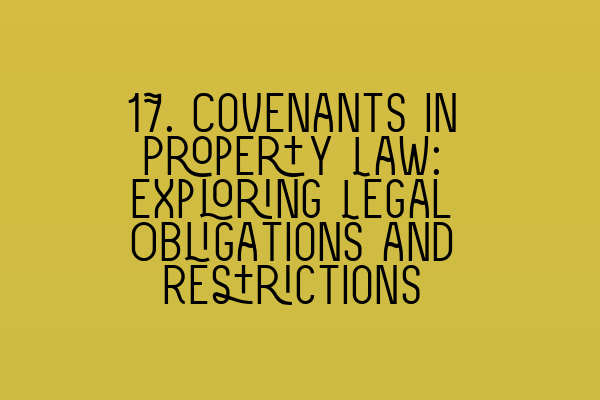In the realm of property law, covenants play a crucial role in defining the legal obligations and restrictions associated with a property. These covenants are legally binding agreements between parties that govern how a property can be used and maintained. They can cover a wide range of topics, from property maintenance to restrictions on certain activities. In this blog post, we will delve into the world of covenants in property law, exploring their nature, types, and importance.
Understanding Covenants in Property Law
Covenants are legal obligations or restrictions that are imposed on a property by the original owner or a subsequent owner. They are designed to ensure that the property is used and maintained in a certain way in order to protect the interests of the property owner and the surrounding community.
There are two main types of covenants: positive covenants and negative covenants. Positive covenants require the property owner to do something, such as maintain the property or contribute to the upkeep of shared areas. On the other hand, negative covenants prohibit certain activities or uses of the property, such as running a business from a residential property or making structural changes without permission.
Enforcement of Covenants
The enforcement of covenants can be a complex legal process. Generally, covenants are enforceable between the original parties to the agreement. This means that if the original owner sells the property, the new owner will also be bound by the covenants. However, there are limitations to the enforceability of covenants, especially if they are considered unreasonable or contrary to public policy.
In some cases, covenants can be enforced by individuals through legal action, seeking an injunction or damages for breach of the covenant. However, it is important to note that not all covenants are enforceable, and their enforcement can depend on various factors, such as the wording of the covenant, the intention of the parties, and the specific circumstances of the case.
Importance of Covenants in Property Law
Covenants serve an important purpose in property law by establishing legal obligations and restrictions that help maintain the value, integrity, and harmony of a neighborhood or community. They provide a framework for property owners to adhere to certain standards and preserve the character of the area.
For example, positive covenants can ensure that properties are well-maintained, contributing to the overall attractiveness of the neighborhood. Similarly, negative covenants can protect the peaceful enjoyment of properties by prohibiting noisy or disruptive activities. By upholding these covenants, property owners can collectively maintain the desirability and livability of the area.
Moreover, covenants can also have financial implications. For instance, some covenants may require property owners to contribute to the maintenance of shared areas, such as roads, parks, or common facilities. These contributions can help fund the upkeep of these amenities, benefiting the entire community and maintaining property values.
In conclusion, covenants in property law are crucial in maintaining order and harmony in a neighborhood or community. They establish legal obligations and restrictions that property owners must adhere to, ensuring the proper use and maintenance of properties. Understanding the nature, types, and enforcement of covenants is essential for property owners, as they are legally binding agreements that can have significant implications.
If you are preparing for the SQE 1 or SQE 2 exams, it is important to have a solid understanding of property law, including covenants. To enhance your preparation, we recommend taking advantage of our SQE 1 Practice Exam Questions and Practice Mocks FLK1 FLK2. Additionally, our SQE 1 and SQE 2 Preparation Courses can provide you with the comprehensive knowledge and skills needed for success in these exams. Stay updated with the latest SRA SQE Exam Dates by visiting our website.
For more information about property law and other relevant topics, be sure to explore our range of articles and resources on property law at the SQE Property Law & Land Law section of our website.
